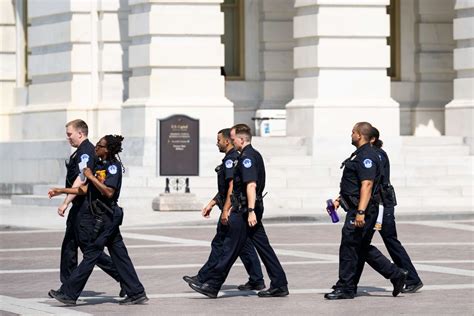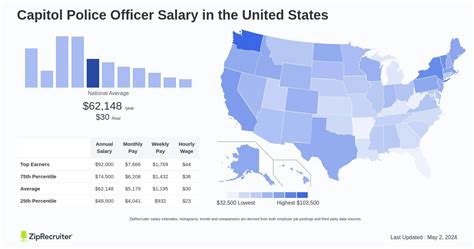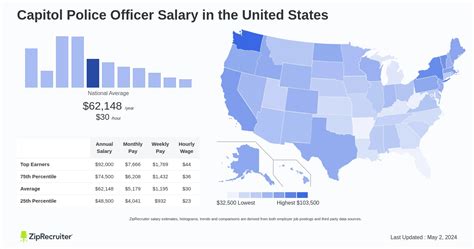A career with the United States Capitol Police (USCP) is more than a job; it's a commitment to protecting the legislative branch of the U.S. government, its members, and the iconic grounds of the U.S. Capitol. For those drawn to a prestigious and impactful career in federal law enforcement, the question of compensation is a critical one. Fortunately, a position with the USCP offers a competitive salary and an excellent benefits package.
Starting salaries for new USCP officers can exceed $76,000 immediately following academy training, with a clear path for advancement that can see experienced officers and specialists earning well over $100,000 annually. This article provides a data-driven look at what you can expect to earn and the key factors that will shape your financial future as a U.S. Capitol Police Officer.
What Does a U.S. Capitol Police Officer Do?

While the most visible role of a USCP officer is providing security at the U.S. Capitol Building, their responsibilities are far more extensive. They are a federal law enforcement agency tasked with a "protective mission" for Congress.
Key duties include:
- Protecting the life and property of members of Congress, their staff, and visitors.
- Patrolling the 270-acre Capitol Complex, which includes the Capitol, House and Senate Office Buildings, and Library of Congress buildings.
- Screening visitors and vehicles entering the Capitol grounds.
- Investigating criminal activity and threats directed at Congress.
- Providing dignitary protection for congressional leadership both in Washington, D.C., and throughout the United States.
- Responding to emergencies, from medical incidents to security threats, within their jurisdiction.
Average U.S. Capitol Police Salary

The compensation for a USCP officer is highly structured, especially at the entry level, offering transparency and predictable growth.
According to the official U.S. Capitol Police recruitment website, the starting salary for a new officer recruit upon graduation from the academy is $76,961 per year (as of early 2024). This figure includes locality pay for the Washington, D.C. area.
Salary aggregators provide a broader look at earnings across different experience levels:
- Salary.com reports the average base salary for a Capitol Police Officer in Washington, D.C. is approximately $79,600, with a typical range falling between $74,300 and $86,400.
- Glassdoor data, based on user-submitted salaries, shows an estimated total pay (including base and additional pay like overtime) for a USCP Officer in the D.C. area averaging around $87,000 per year.
It is crucial to note that these figures represent base pay and standard ranges. Overtime opportunities, which are common in law enforcement, can significantly increase an officer's annual income.
Key Factors That Influence Salary

While the starting salary is fixed, several factors determine your earning potential and career trajectory within the USCP.
Years of Experience
Experience is the most direct driver of salary growth in the USCP. The department uses a federally-structured pay scale with automatic "step" increases. An officer's salary will increase annually for the first several years of their career, assuming satisfactory performance. After approximately four and a half years of service, an officer can reach the rank of Private First Class, which comes with another significant pay increase. Further advancement through promotion to ranks like Sergeant, Lieutenant, or Detective will move an officer to a higher pay grade, substantially increasing their earning potential.
Area of Specialization
Once an officer has completed their probationary period (typically one year), they can apply for specialized units. These assignments often require advanced training and skill, and they can lead to higher pay or significant overtime opportunities. Key specializations include:
- Containment and Emergency Response Team (CERT): The USCP's tactical team, similar to a SWAT unit.
- K-9 Unit: Handlers who work with bomb-sniffing or patrol dogs.
- Dignitary Protection Division: Plainclothes officers who provide security for congressional leaders.
- Threat Assessment Section: Investigators who analyze and mitigate threats against members of Congress.
- Criminal Investigations Division: Detectives who investigate crimes within the Capitol Complex.
Geographic Location
For most professions, location is a primary salary factor. However, for the U.S. Capitol Police, this is unique. The vast majority of officers are stationed in Washington, D.C. Therefore, the salary is not variable by location but is instead *defined* by it. The official salary already includes a locality pay adjustment, which is a federally mandated increase to base pay designed to compensate employees for the high cost of living in the D.C. metropolitan area.
Company Type
The "company type" for a USCP officer is the U.S. Federal Government. This is a significant advantage. Compared to many state and local police departments, federal law enforcement often offers a more robust and comprehensive benefits package, which should be considered part of the total compensation. These benefits include:
- Federal Employees Retirement System (FERS): A three-tiered pension plan.
- Thrift Savings Plan (TSP): A 401(k)-style retirement savings plan with government matching contributions.
- Federal Employees Health Benefits (FEHB) Program: A wide selection of health insurance plans.
- Generous paid time off, including annual leave, sick leave, and federal holidays.
Level of Education
While a high school diploma or GED is the minimum educational requirement to apply, a higher level of education can be a significant asset for career advancement. A bachelor's or master's degree, particularly in fields like criminal justice, forensic science, cybersecurity, or public administration, does not increase the starting salary. However, it makes a candidate highly competitive for promotions and for entry into specialized investigative or analytical units that command higher pay grades.
Job Outlook

The U.S. Bureau of Labor Statistics (BLS) provides projections for the broader category of "Police and Detectives." According to the BLS's Occupational Outlook Handbook, employment for this group is projected to grow 3 percent from 2022 to 2032, which is about as fast as the average for all occupations.
The BLS notes that there will be approximately 63,300 openings for police officers and detectives each year, on average, over the decade. Most of these openings are expected to result from the need to replace workers who transfer to different occupations or exit the labor force, such as to retire.
For a specialized federal agency like the USCP, demand remains consistently high due to ongoing national security concerns, the need to protect the continuity of government, and a steady rate of retirements.
Conclusion

A career as a U.S. Capitol Police Officer offers a clear and compelling financial path. With a strong starting salary, structured pay progression, and excellent federal benefits, it is a financially stable and rewarding profession from day one. For individuals with a dedication to public service and a drive for continuous professional growth, the opportunities for advancement into specialized, high-paying roles are plentiful. If you are seeking a law enforcement career that combines purpose with strong earning potential, the U.S. Capitol Police presents an exceptional opportunity.
